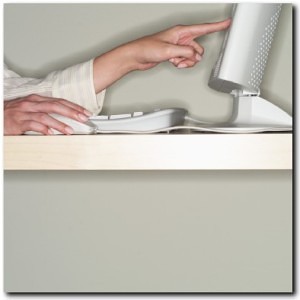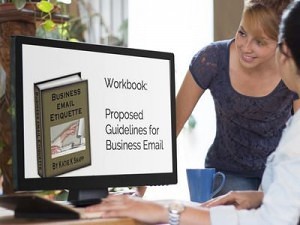Email Etiquette – 5 Deciding Factors
Or worse yet, have you ever wondered if YOU are the email etiquette violator in the office?
There are plenty of flubs that can cost you your professional appearance and dignity. Improper grammar, misspelled homonym, or a proper noun without capitalization. Little things make a big difference.
Poor customer service, now indelibly marked upon an ether cloud to haunt your reputation forEVER, printed in an email like this:
You really irritated our customers yesterday. We need to talk about it.
Not cool … or how about not-so-businesslike use of the system: There are extra Girl Scout Cookies in the break room! OR calling someone out in email, like sending a tough message, AND doing it with a REPLY ALL: Jerry, I don’t like the way you made the decision to go forward.
Ouch.
Oh where to start?
First, take inventory of what is nagging you, which, BeeTeeDubs can be a very therapeutic step. What’s not working and why it is bugging you?
Not all email guidelines are created equal. Some may be well worth leaving alone. For example, using ALL lower case letters in internal memo’s could be a battle worth letting go. However, if that habit could easily bleed into the communication with key clients, and emails could contain technically unacceptable grammar, then you may want an across-the-board mandate to use appropriate capitalization.
Use the following checklist to preview potential hurdles. Select the issues that are key to your work environment:
All EMAIL is not created EQUAL. Where you set your office standards depends on 5 factors.
The 5 Deciding Factors that Set Your Email Standard
- Consistency
How important is consistency? Are there reasons not to be consistent? Think about that because consistency often hinders flexibility. Example: Does your office require a certain format for signature blocks? What if someone sees the need to veer from that? Should people to have the freedom to stray or should you rule with an iron fist?
The importance of email in delivering your service will likely be the biggest factor that determines your need for consistency.
2. Professionalism
Is your office poised for professionalism to be declared as an email ground rule? A law office will take a bigger hit for an unprofessional email than, say, a plumbing contractor’s office. Leave the plumber be – his talents lie elsewhere.
3. Creativity
If your office should exhibit ingenuity, then creativity may be an issue to include when setting your email guidelines. Some quirkiness in an advertising company is good. Same with a film studio. For example, using color is not a great idea in emails, but there may be creative work environments where it helps promote the type of environment you desire. PS – I don’t want my lawyer using pink flashing fonts set to music, no matter how much creativity it exhibits.
4. Low/High technical competence
Is the workplace technically focused? I ask this because fidgeting with email functionality can get complicated. For setting Outlook parameters, expect more from the technically competent. The others may need help from the guru’s or you may decide not to make it a guideline.
5. Educational background
Where are employees on this scale? Are certain grammar guidelines a stretch to expect? Should other areas have more emphasis? On the flip side, I hold educators to a high standard when it comes to preserving the English language in their written communication. Same with PhD’s, regardless of their field.
Determining to what degree these factors are at play will guide you in determining your email standards.
Get this 24-page Email Etiquette Ebook here for $22.
All these guidelines are in the Email Etiquette EBOOK tutorial PLUS
How to assess what you or your office may need
Writing Email guidelines
Setting rules for appropriateness and tone
Grammar basics
plus exercises for practicing good habits like being succinct in your language.
Great for an office Lunch & Learn session!

Good stuff! Love it!